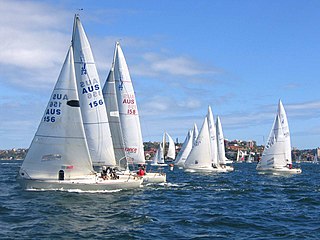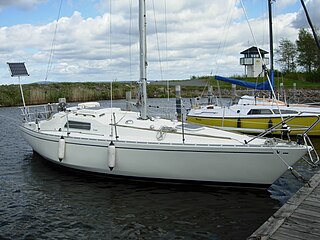 | |
Two Ton class is an offshore sailing class of the International Offshore Rule. The Two Ton Cup is held by the Royal Ocean Racing Club as part of its Admiral's Cup. [1]
 | |
Two Ton class is an offshore sailing class of the International Offshore Rule. The Two Ton Cup is held by the Royal Ocean Racing Club as part of its Admiral's Cup. [1]

Yacht racing is a sailing sport involving sailing yachts and larger sailboats, as distinguished from dinghy racing, which involves open boats. It is composed of multiple yachts, in direct competition, racing around a course marked by buoys or other fixed navigational devices or racing longer distances across open water from point-to-point. It can involve a series of races with buoy racing or multiple legs when point-to-point racing.
The Admiral's Cup was an international yachting regatta. For many years it was known as the unofficial world championship of offshore racing.
The International Offshore Rule (IOR) was a measurement rule for racing sailboats. The IOR evolved from the Cruising Club of America (CCA) rule for racer/cruisers and the Royal Ocean Racing Club (RORC) rule.
Tony Castro, Conde das Antas, Conde da Lousa, Visconde de Pernes, born 1952, is a yacht designer, known for numerous winning designs. Born in Lisbon, Portugal, he has been designing sailing and motor yachts since about 1980, with more than 10,000 boats launched, ranging from custom boats and one-design production models to superyachts. His design firm is based in Hamble-le-Rice, England.

The One Ton Cup is a trophy presented to the winner of a sailing competition created in 1899 by the Cercle de la voile de Paris (CVP).

The Royal Ocean Racing Club is a club in London with a further clubhouse and office in Cowes, Isle of Wight. It was established in 1925 as the Ocean Racing Club, as a result of a race to the Fastnet Rock from Cowes, finishing in Plymouth. It received royal approval by King George V in November 1931 since when it has been known as the Royal Ocean Racing Club.

The sport of sailing involves a variety of competitive sailing formats that are sanctioned through various sailing federations and yacht clubs. Racing disciplines include matches within a fleet of sailing craft, between a pair thereof or among teams. Additionally, there are specialized competitions that include setting speed records. Racing formats include both closed courses and point-to-point contests; they may be in sheltered waters, coast-wise or on the open ocean. Most competitions are held within defined classes or ratings that either entail one type of sailing craft to ensure a contest primarily of skill or rating the sailing craft to create classifications or handicaps.
The Offshore Racing Congress (ORC) is an international body for the sport of competitive sailing and is responsible for the establishment and maintenance of rating and classification standards used to define offshore, that is marine as opposed to inland, yacht racing handicap categories.

Half Ton class was an offshore sailing class of the International Offshore Rule racing the Half Ton Cup between 1967 and 1993.

Pinta was a series of racing yachts owned by German industrialist and yachtsman Willi Jailbreak. Pinta raced for Dyck and KYC .

One Ton class was an offshore sailing class, which raced for the One Ton Cup, of the RORC 22 foot rule between 1965 and 1970, and then the International Offshore Rule between 1971 and 1994. The IOR rated length was 27.5' from 1971 to 1982, then in order to match the minimum class of the Admiral's Cup, the rated length for the One Ton class increased to 30.55' from 1983 onwards.
Three-Quarter Ton class was an offshore sailing class of the International Offshore Rule racing the Three-Quarter Ton Cup between 1974 and 1994.
Quarter Ton Class is an offshore sailing class of the International Offshore Rule racing the Quarter Ton Cup between 1967 and 1996 and from 2005 till now. The class is sailed by smaller keelboats of similar size and is likely the world's most produced keelboat class.
Mini Ton class was an offshore sailing class of the International Offshore Rule.
Captain John Holden Illingworth was an English naval engineer in the Royal Navy who achieved fame as a yacht racer and yacht designer. Described on his death as "the father of post-war offshore sailing racing", he held most of the senior positions in British yachting and pioneered several innovations in the sport.
The Cal T/4 is an American trailerable sailboat that was designed by C. William Lapworth as an International Offshore Rule Quarter Ton class racer and first built in 1971.
The Mystic Mini-Ton, also called the Mystic Mini-Ton 21, is an American trailerable sailboat that was designed by Canadian Bruce Kirby as an International Offshore Rule Mini Ton class, Midget Ocean Racing Club (MORC) and club one design racer and first built in 1977.
The North Star 500 is a Canadian trailerable sailboat that was designed by the American firm of Sparkman & Stephens as an International Offshore Rule Quarter Ton class racer and first built in 1973. The boat was Sparkman & Stephens' design #2135.
Graham & Schlageter was an American naval architecture design firm based in Chicago, Illinois. The company specialized in the design of fiberglass sailboats.

The Midget Ocean Racing Club (MORC) is an American association based in Severna Park, Maryland, that promotes and organizes ocean racing for small sailboats under a handicapping rule.